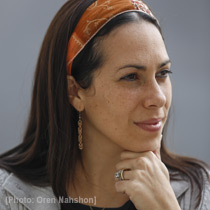There are 185,000 Holocaust survivors living in Israel. One in four lives in poverty.
It was a little over two years ago when I met Rachel, an 85-yearold in Hadera. “I’m so happy to see you,” she said, completely out of breath as she opened the door to her old, run-down sixth floor apartment. I gave her a hug, handed her a thick blanket so she could warm herself, and sat with her on the stained couch in her living room.
“I’m a Holocaust survivor. Yet sometimes, I see my survival as more of a curse than a blessing,” she said. I sat silent, in shock, waiting for her to continue. “I live alone. No one comes to visit me. I’m poor, and I’m terrified each day that I’ll have an asthma attack and die here alone.” Tears ran down my cheeks as I held her hand and tried to offer her words of comfort. Yet few came to mind.
What is the right thing to say to a Holocaust survivor who lives on $800 a month and can barely afford rent, medicine and food let alone an ambulance ride to the hospital when she’s feeling ill? What comforting words are there to offer to an elderly woman who suffers from asthma, can barely walk down the six flights of stairs in her apartment building to get some fresh air, and adamantly refuses to call an ambulance when she’s in need of medical care because she knows that if she is not hospitalized she will need to pay the $150 ambulance fee a significant portion of her monthly state stipend?
I stayed with Rachel for more than an hour, wrapped her in the Fellowship-donated blanket I brought to her, turned on the new heater we provided for her, and then hesitantly left. I knew I couldn’t stay with her forever. But leaving Rachel alone with her fears and illness broke my heart.
Two weeks later, I got word that Rachel died of an asthma attack, alone in her apartment.
I slammed my fist on the table upon hearing about Rachel, and began to cry. “How many Holocaust survivors need to die in these conditions before the world wakes up to help?” I said to my father, Rabbi Eckstein. “The Fellowship already provides food, elderly clubs, and volunteers to visit Holocaust survivors in Israel, but I see now that we must also provide more medical care.” My father looked me straight in the eye, and promised that, together, we would make this happen.
In the bittersweet completion of a painful full circle, last week I returned to Hadera to visit Malka, an 84-year-old Holocaust survivor with a story very similar to Rachel’s.
But the difference is that Malka won’t die from a treatable medical problem for fear of not being able to afford an ambulance ride to the hospital. Malka has received a free Fellowship Emergency Bracelet, which includes a button she can press that provides her with immediate access to a doctor, ambulance and anything else she needs in an emergency situation. It has already saved her life twice in the past two weeks.
“Two days after I received the emergency bracelet, I woke up in the middle of the night, weak and dizzy, with my heart beating fast,” Malka told me. “I immediately pressed the button and there was a doctor at my home in no time. And then two nights ago at 3 a.m., there were men screaming and banging on my door. I pressed the emergency button, explained to the operator what was going on, and immediately two police officers arrived.”
Malka closed her eyes and placed her shaking hand on the emergency bracelet on her wrist. “This is my children, this is my family. There is no one else who cares for me,” she said, with desolation in her voice.
This project has been heaven-sent for Malka, and has reminded me that for every day we wait to help these Holocaust survivors, we risk losing them.
It’s been a long road and difficult journey making this project come to life, yet two years later in Rachel’s honour thousands of needy Holocaust survivors like Malka have a free emergency button on their walls and on a bracelet, which enables them to order an ambulance, doctor home visit, or volunteer visitor nearly free of charge.
Unfortunately, Malka and Rachel’s situations are not isolated; tens of thousands of poor Holocaust survivors in Israel have the same fears and worries, and are stuck in the same losing battle for survival.
The statistics are heartbreaking.
There are 185,000 Holocaust survivors living in Israel. One in four lives in poverty. Each day in Israel 40 Holocaust survivors die. My firsthand experience in the field makes me confident that this number can be lowered. My prayer is that together we will make it happen.




